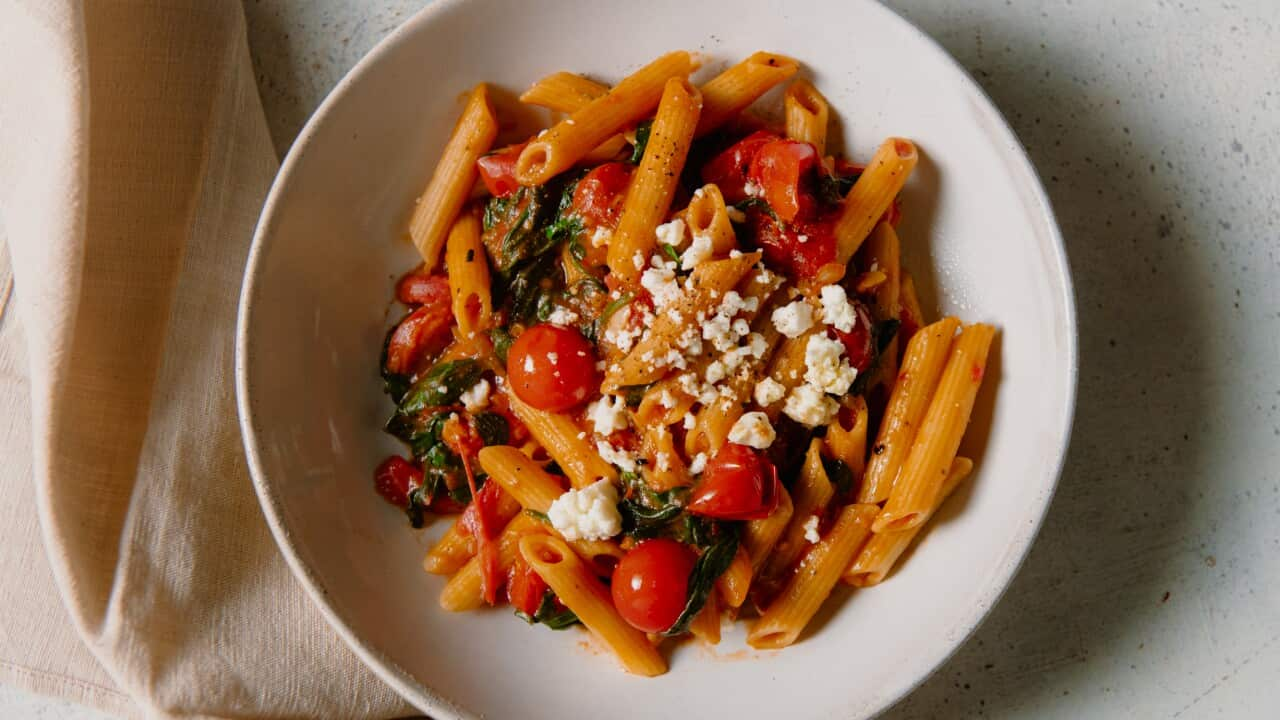-- Watch weeknights on SBS Food (Ch.33) at 7.00pm. Stream all episodes anytime at ---
Stream free On Demand

The Thrifty Dinner Club
episode • The Cook Up with Adam Liaw • cooking • 25m
G
episode • The Cook Up with Adam Liaw • cooking • 25m
G
When the food budgeting queen and cookbook author – – was in her late 20s, the world of cooking was somewhat forced upon her. As she tells SBS, she learned how to cook through necessity, not choice.
“It was difficult,” says 39-year-old Goodwin, reflecting on the past. “I was a single mum with three kids and didn't know how to cook because I wasn't taught at school or home. I was really struggling with having a reduced income and didn’t know how to feed my family nutritious meals they would actually enjoy, on that income. So I started watching cooking shows and I taught myself how to cook.”
Knowing how to cook good food on a budget has become a necessity because of increases in the cost of living.
Over time, Goodwin’s skills blossomed and she developed an unexpected passion for cooking.
Goodwin soon found her happy place. She became a recipe developer who created nutritious and tasty meals that were also affordable.
“I think there are a lot of people who are now in the same situation that I was in," says Goodwin, a guest on on SBS.
"A lot of us weren’t taught cooking or budgetary skills. Knowing how to cook good food on a budget has become a necessity because of increases in the cost of living.
How to eat well on a $10 budget
Despite rising grocery costs, Goodwin believes it is currently possible to cook delicious food for a family (or group of mates) on a $10 budget.
“You just need basic cooking skills and the ability to budget and grocery shop [with affordability in mind]."
Once you’ve got the basics covered, the low-cost cooking world will become your frozen oyster (because they’re cheaper). So here are Goodwin’s top tips to help you stretch $10 even further.
1. Substitute ingredients
Goodwin tells home cooks to get creative with ingredient substitutions. Swap expensive cuts of meat, fruits or vegetables that are out of season with food items that are on special.
“Make my recipes your own and adapt them to suit your budget. Make changes according to the ingredients that are in your price range that are also available at the shops.”
Plan meals for the whole week or at least, the next few days, rather than just one night.
2. Think weekly not nightly
Think ‘big picture’ and plan ahead.
“It’s really hard to put a meal together right now for $10. But the way I do it is to group meals together in a meal plan and share ingredients across the week. Plan meals for the whole week or at least, the next few days, rather than just one night."
That means your budget might be $70 for a week of dinners instead of $10 a night, although it breaks down to be the same cost.
“By doing this, you will use up all the herbs, meat or vegetables you buy throughout your meal plan. You will reduce food waste. You will also lower your total grocery bill by spreading the cost across many meals during the week.”
3. Buy cheap cuts of meat
Goodwin recommends that home cooks take the time to learn ‘how’ to use cheaper cuts of meat and cook them well.
“For instance, I may buy a large budget cut of a budget of beef, (like blade or brisket), for under $15 per kilo at the supermarket. I'll use that budget cut over three nights across different meals. It's all about the preparation of the meat. To make it really nice and tender, you could tenderise it first and use it in a curry or stir-fry. Or, slow cook it. “
Goodwin’s other trick is to always buy chicken on the bone. “You can buy drumsticks for $4 a kilo. Then, use them to make chicken soup. Shred the excess chicken off the bone and you will have pulled chicken to use in a few more meals.”
It sounds so simple, but shopping seasonally is key.
4. Opt for seasonal produce
“It sounds so simple, but shopping seasonally is key. You may go into the supermarket thinking that you have to get broccoli, but broccoli is too expensive. So buy cheaper vegetables that are in season instead.”
It may also be wise to replace fresh ingredients with frozen, jarred or tinned fruits and vegetables.
As Goodwin says, as the cost of living increases, it may still possible to eat flavoursome, nutritious and varied meals.
“It just takes a little bit more of an investment of time to plan a weekly menu, to research recipes and find ingredients that people in your household love to eat. But it is achievable."
Easy recipes to feed many

Takoyaki





